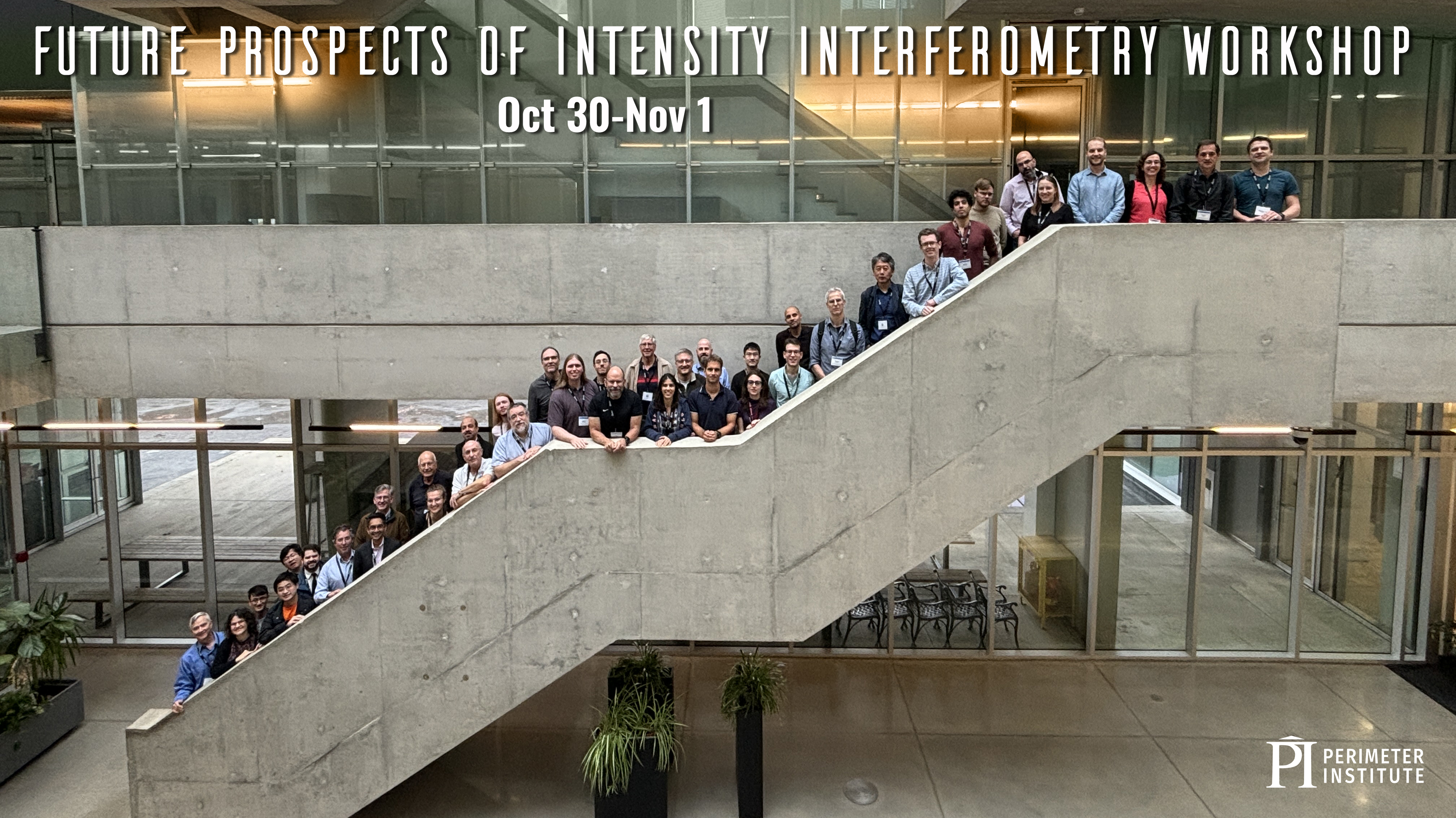Format results
-
Talk
-
Achieving the Heisenberg limit using fault-tolerant quantum error correction
Himanshu Sahu Perimeter Institute for Theoretical Physics
PIRSA:25100180 -
1/2-BPS line defects in 4d N = 2 SQFTs via Cohomological Hall algebras
Nikita Grygoryev Perimeter Institute for Theoretical Physics
PIRSA:25100196 -
Lorentzian Quasicrystals and the Irrationality of Spacetime
Sotirios Mygdalas Perimeter Institute for Theoretical Physics
PIRSA:25100182 -
-
D branes and Chern Simons Link Invariants
Suriyah Rajalingam Kannagi Perimeter Institute for Theoretical Physics
PIRSA:25100184 -
Initial-Boundary-Value Problem in General Relativity
Antonia Seifert Perimeter Institute for Theoretical Physics
PIRSA:25100185 -
Entropies for gravitational systems from simplicial Lorentzian path integrals
José de Jesús Padua Argüelles Perimeter Institute for Theoretical Physics
PIRSA:25100186 -
Open Quantum Dynamics with Nonlinear Symmetries
Jury Radkovski Perimeter Institute for Theoretical Physics
PIRSA:25100187
-
-
Talk
-
-
Topological Quantum Spin Glass Order
Nikolas Breukmann University of Bristol
-
Harnessing qudits for quantum simulations
Christine Muschik Institute for Quantum Computing (IQC)
-
Chiral Color Code : Single-shot error correction for exotic topological order
Dongjin Lee Perimeter Institute for Theoretical Physics
PIRSA:25100151 -
Architectural mechanisms of a universal fault-tolerant quantum computer
Shayan Majidy Harvard University
PIRSA:25100149 -
Decoding Multimode Gottesman-Kitaev-Preskill Codes with Noisy Auxiliaries
Marc-Antoine Roy Université de Sherbrooke
PIRSA:25100150 -
Keynote
John Preskill California Institute of Technology (Caltech) - Division of Physics Mathematics & Astronomy
-
-
-
Talk
-
-
-
-
-
-
-
-
Alumni Stories: Prince Osei
Prince Osei African Institute for Mathematical Sciences (AIMS) - Next Einstein Initiative (NEI) Global Team
PIRSA:25090064
-
-
Talk
-
Opening Remarks
-
Marcela Carena Perimeter Institute for Theoretical Physics
-
Kendrick Smith Perimeter Institute for Theoretical Physics
-
-
Cosmology: the last 25 years
Matias Zaldarriaga -
Measuring H0 and dark energy with DESI
Will Percival University of Waterloo
-
-
-
Observable B modes from Cosmological Phase Transitions
Gordon Krnjaic -
Neutron Star Mergers: Probes of Extreme Matter
Pablo Bosch Gomez -
Can LIGO Detect Daylight Savings Time?
Reed Essick
-
-
Talk
-
Opening Remarks
Selim Hotinli Perimeter Institute for Theoretical Physics
-
-
-
Baryon feedback: How extreme is too extreme?
Alexandra Amon Princeton University
-
Cosmological feedback from a halo assembly perspective
Hiranya Peiris University of Cambridge
-
-
-
-
-
Talk
-
Opening Remarks
-
Marcela Carena Perimeter Institute for Theoretical Physics
-
Emily Petroff Perimeter Institute for Theoretical Physics
-
Chris Waddell Perimeter Institute for Theoretical Physics
-
-
-
Chaos and the Emergence of the Cosmological Horizon
David Kolchmeyer Massachusetts Institute of Technology
-
Operator Algebras and Third Quantization
Nima Lashkari Purdue University West Lafayette
-
Swing Surfaces in AdS/CFT
Sabrina Pasterski Perimeter Institute for Theoretical Physics
-
An Emergent Area Operator in 2d CFT
Ronak Soni Chennai Mathematical Institute
-
Gravity As An Oracle (Vision Talk)
Raphael Bousso University of California, Berkeley
-
Vacuogenesis (Vision Talk)
Ted Jacobson University of Maryland, College Park
-
-
Talk
-
Opening Remarks
-
Marcela Carena Perimeter Institute for Theoretical Physics
- Laurent Freidel
PIRSA:25060029 -
-
-
-
-
-
-
Gravitational collapse, shock waves and white holes
Viqar Husain University of New Brunswick
PIRSA:25060035 -
Building and (hints of) seeing gravitational statistical mechanics
Seth Major Hamilton College
PIRSA:25060036
-
-
Talk
-
-
Causal Inference Meets Quantum Physics
Robert Spekkens Perimeter Institute for Theoretical Physics
PIRSA:25040086 -
Creativity by Compositionality in Generative Diffusion Models
Alessandro Favero École Polytechnique Fédérale de Lausanne
PIRSA:25040088 -
Towards a “Theoretical Minimum” for Physicists in AI
Yonatan Kahn Princeton University
PIRSA:25040089 -
Solvable models of scaling and emergence in deep learning
Cengiz Pehlevan Harvard University
PIRSA:25040091 -
Architectural bias in a transport-based generative model : an asymptotic perspective
Hugo Cui Harvard University
PIRSA:25040092 -
Statistical physics of learning with two-layer neural networks
Bruno Loureiro École Normale Supérieure - PSL
PIRSA:25040093 -
Renormalization Group Flows: from Optimal Transport to Diffusion Models
Jordan Cotler Harvard University
PIRSA:25040095
-
-
Talk
-
Panel Discussion
-
Shirley Ho Flatiron Institute
-
Vicky Kalogera Northwestern University
-
Roger Melko University of Waterloo
-
Jesse Thaler Massachusetts Institute of Technology (MIT)
-
Marcela Carena Perimeter Institute for Theoretical Physics
PIRSA:25040079 -
-
-
Opening Remarks
PIRSA:25040109 -
EAIRA: Establishing a methodology to evaluate LLMs as research assistants.
Frank Cappello Argonne National Laboratory
PIRSA:25040059 -
State of AI Reasoning for Theoretical Physics - Insights from the TPBench Project
Moritz Munchmeyer University of Wisconsin–Madison
PIRSA:25040061 -
UniverseTBD: Democratising Science with AI & Why Stories Matter
Ioana Ciuca Stanford University
PIRSA:25040062 -
-
-
-
Talk
-
-
Snap, Crackle and Pop
Roger Blandford Roger Blandford
-
-
Black Hole Jet Sheath as a Candidate for the Comptonizing Corona
Navin Sridhar Stanford University
-
-
Workshop Talk
Luciano Combi Perimeter Institute for Theoretical Physics
-
Rethinking The Black Hole Corona as an Extended, Multizone Outflow
Lia Hankla University of Maryland, College Park
-
Quantifying flux rope characteristics in relativistic 3D reconnection simulations
Jesse Vos Katholieke Universiteit Leuven
PIRSA:25030133
-
-
Talk
-
Quantum Spacetime: from Speculation to Numbers
Renate Loll Radboud Universiteit Nijmegen
-
Quantum Gravity through the lens of Effective Field Theory
Alessia Platania University of Copenhagen
-
Planck-scale violations of relativistic symmetries in astrophysics and in quantum systems
Giulia Gubitosi University of Naples Federico II
PIRSA:25030057 -
Quantum Dynamics of Causal Sets: Results and Challenges
Sumati Surya Raman Research Institute
-
Ensembles of open quantum systems as a tool for quantum spacetime
Sarah Shandera Pennsylvania State University
-
Exploring the expanding Universe with the Dark Energy Survey
Jessica Muir University of Cincinnati
-
Gravitational waves as a window on gravity
Jocelyn Read California State University, Fullerton
-
Quantum Gravity in the era of Gravitational-Wave astronomy
Mairi Sakellariadou King's College London
-
-
Talk
-
-
Intensity correlations: imaging and quantum optics in astrophysics
Robin Kaiser The French National Centre for Scientific Research
-
Intensity Interferometry with the H.E.S.S. telescopes
Naomi Vogel ECAP, FAU Erlangen-Nürnberg
-
Progress Toward Multi-Channel Intensity Interferometry with the Southern Connecticut Stellar Interferometer
Elliott Horch Southern Connecticut State University
-
-
The Multi Aperture Spectroscopic Telescope: Status and potential as an intensity interferometry facility
Sagi Ben Ami Weizmann Institute of Science
-
-
Future Astrophysical Targets for Intensity Interferometry
Norman Murray University of Toronto
-
-
Perimeter Graduate Conference 2025

The annual Graduate Students’ Conference showcases the diverse research directions at Perimeter Institute, both organized and presented by the students. Our graduate students are invited to share their best work with their fellow PhD students, PSI students and other PI residents interested in hearing about physics research and discussing it in a lively atmosphere full of questions.
-
Year of Quantum Across Canada

Year of Quantum Across Canada: From Fundamental Science to Applications
The Institute for Quantum Computing and the Perimeter Institute for Theoretical Physics will jointly host a meeting celebrating the 100 year anniversary of the discovery of quantum mechanics.
The conference will celebrate and aim to strengthen the quantum information science community in Canada and beyond, by bringing together leading Canadian researchers as well as members of the broader quantum community. The program will highlight the fundamental advances being made in quantum information theory and how these advances lead to applications.Topics included in the program:
- Quantum metrology
- Quantum simulation and quantum advantage
- Quantum error-correction and fault tolerance
- Quantum complexity and algorithms
- Quantum communication and networks
- Quantum cryptography
- Quantum information in quantum matter and quantum gravity
:: :: ::
Recorded Archive of Talks
Day 1 - Monday Oct 6 at IQC:
https://www.youtube.com/live/RXHSelMTHhUDay 2 - Tuesday Oct 7 at IQC:
https://www.youtube.com/live/e5Qx7xuAMpQDay 3 and 4 - Wednesday Oct 8 and Thursday Oct 9 at Perimeter:
https://pirsa.org/c25033:: :: ::
Speakers
Christian Bauer (Lawrence Berkeley National Laboratory)
Alexandre Blais (Université de Sherbrooke)
Sergey Bravyi (IBM Research - Thomas J. Watson Research Center)
Nikolas Breuckmann (University of Bristol)
Eric Chitambar (University of Illinois at Urbana-Champaign)
Soonwon Choi (MIT)
Zohreh Davoudi (University of Maryland)
Matthew Fisher (University of California, Santa Barbara)
Dakshita Khurana (University of Illinois Urbana-Champaign)
Aleksander Kubica (Yale University)
Hank Lamm (Fermilab)
Laura Mancinska (University of Copenhagen)
Antonio Mezzacapo (IBM)
John Preskill (Caltech)
Martin Savage (University of Washington)
Brian Swingle (Brandeis University)
Nathan Wiebe (University of Toronto)
Yu-Xiang Yang (The University of Hong Kong)Co-Chairpersons
Marcela Carena (Perimeter Institute & University of Chicago & Fermilab)
Norbert Lütkenhaus (University of Waterloo, Institute for Quantum Computing)Scientific Organizers and Convenors
Alexandre Blais (Université de Sherbrook)
Anne Broadbent (University of Ottawa)
Shohini Ghose (Wilfrid Laurier University & Quantum Algorithms Institute)
David Gosset (University of Waterloo, IQC, Perimeter Institute)
Tim Hsieh (Perimeter Institute)
Ray Laflamme (University of Waterloo, IQC)
Alex May (Perimeter Institute)
Christine Muschik (University of Waterloo, IQC, Perimeter Institute)
John Preskill (CalTech)
Barry Sanders (University of Calgary & Quantum City)
Aephraim Steinberg (University of Toronto, CQIQC)
Beni Yoshida (Perimeter Institute)
Peter Zoller (University of Innsbruck & IQOQI)
Sisi Zhou (Perimeter Institute) -
Beyond Perimeter - Alumni 25th Anniversary Event
Since its founding, training has been a cornerstone of Perimeter Institute’s mission. Over the years, we have supported nearly 1,000 postdoctoral researchers and graduate students along their academic journeys. Many have gone on to make remarkable contributions in academia and industry, while others have focused on creating positive change in the world.
To mark Perimeter’s 25th Anniversary, we are proud to host the inaugural Perimeter Circle Alumni Awards event.
A shortlist of Award nominees will be providing talks and networking sessions in this 2-day event.
Join us to meet these outstanding alumni and hear their stories beyond Perimeter.
2025 Perimeter Circle Alumni Award Shortlisted Nominees:
Academic Leadership Excellence:
- Jonathan Barrett
- Claudia de Rham
- Astrid Eichhorn
- Flaminia Giacomini
- Stefania Gori
- Andrei Olegovich Starinets
- Chanda Prescod-Weinstein
- Robert Raussendorf
- Rowan Thomson
- Will Witzak-Krempa
This event is open to Perimeter Residents, Associates and Alumni. All talks will be broadcast online. Onsite participation registration deadline is September 22.
Separate registration was required for Commnitech Breakfast on Thursday. The breakfast is now fully booked! If you did not register in advance there are no more seats available for this event.
PARKING NOTICE for September 25. Perimeter Parking lot will be closed. Please park at the MUSEUM LOT entrance is on Father David Bauer Drive off of Erb Street.
Note: The Career Trajectories and Advancement departments at Perimeter Institute will provide the meals for Thursday’s event for all approved participants. If you are unable to attend after being approved, you must notify the organizers in advance. No-shows on the day of the event will be subject to a $20 cancellation fee.
-
Charting the Future Symposium

Charting the Future Symposium: Big questions in particle physics, strong gravity, and cosmology over the next 25 years
Join us for a special symposium celebrating Perimeter’s 25th anniversary. This event offers a unique opportunity to unite Perimeter alumni and friends in the fields of cosmology, particle physics, and strong gravity with our extended community, reflect on a quarter-century of discovery, and look ahead to the challenges and opportunities that will shape the next 25 years of fundamental physics.
Over the past quarter-century, we have witnessed transformative advances across our fields. In particle physics, the discovery of the Higgs boson crowned decades of effort, while precision experiments continue to probe the Standard Model and search for new physics. In strong gravity, the direct detection of gravitational waves has opened a new observational window onto black holes, neutron stars, and the very fabric of spacetime. In cosmology, precision measurements of the cosmic microwave background and large-scale structure have revolutionized our understanding of the universe’s origins and evolution, even as dark matter and dark energy remain profound mysteries.
As we look to the future, a new generation of experiments, observations, and theoretical ideas promises to drive further revolutions. From uncovering physics beyond the Standard Model to probing the nature of spacetime and the earliest moments of the cosmos, the next 25 years are poised to be as transformative as the last.
This symposium will bring together leading researchers, young scientists, alumni, and friends to celebrate past achievements, and imagine the discoveries yet to come. We invite you to be part of this landmark event at Perimeter Institute, as we honor the spirit of curiosity, ambition, and collaboration that has defined our journey so far — and will carry us forward.

Invited Speakers
- Haipeng An (Tsinghua University)
- Masha Baryakhtar (University of Washington)
- Brian Batell (University of Pittsburgh)
- Laura Bernard (Observatoire de Paris)
- Richard Bond (CITA)
- Pablo Bosch Gomez (Utrecht University)
- Latham Boyle (University of Edinburgh)
- Patrick Brady (University of Wisconsin-Milwaukee)
- Joe Bramante (Queen's University)
- Savas Dimopoulos (Perimeter Institute)
- Adrienne Erickcek (University of North Carolina at Chapel Hill)
- Stefania Gori (UC Santa Cruz)
- Chad Hanna (Pennsylvania State)
- Renée Hložek (University of Toronto)
- Yoni Kahn (University of Toronto)
- Vicky Kaspi (McGill University)
- Gordan Krnjaic (Fermilab)
- Ian Low (Northwestern University)
- Mathew Madhavacheril (University of Pennsylvania)
- David Morissey (TRIUMF)
- Moritz Münchmeyer (University of Wisconsin-Madison)
- Ue-Li Pen (CITA, Perimeter Institute)
- Will Percival (Perimeter Institute)
- Maxim Pospelov (University of Minnesota)
- Josef Pradler (Austrian Academy of Sciences)
- Daniel Siegel (University of Greifswald)
- Nils Siemonsen (Princeton University)
- Carlos Wagner (University of Chicago)
- Huan Yang (Tsinghua University)
- Matias Zaldarriaga (IAS)
:: :: ::
Organizing Committee
Asimina Arvanitaki
Luis Lehner
Sergey Sibiryakov
Kendrick Smith -
Cosmic Ecosystems
 In the past three decades, one of the most transformative insights in cosmology has been the realisation that the formation and evolution processes of cosmic structures such as supermassive black-holes, galaxies and clusters are deeply interconnected with the vast cosmic web that underpins the Universe. These processes do not happen in isolation, but are part of a dynamic ecosystem where matter and energy flow across scales, driving the growth and transformation of cosmic environments. Understanding this complex system, in particular the circum-galactic medium (CGM), is not only key to deciphering how matter is cycled and redistributed through accretion via filaments and outflows from AGN and supernovae, but also crucial for unlocking the next generation of discoveries in areas such as dark matter, the behaviour of the cosmic web, the forces that shape cosmic evolution, and more.This conference seeks to bring together cosmologists and astrophysicists to foster collaborative exploration of these interconnected cosmic ecosystems. By focusing on how structures interact with their environments across cosmic scales, this conference aims to catalyse groundbreaking discoveries in both astronomy and physics, providing fresh insights into the forces that govern the Universe. Special attention will be given to the joint analysis of large-scale structure and weak gravitational lensing data from surveys such as DESI, Euclid, LSST and Roman with CMB data from the Simons Observatory and CMB-S4, as well as how these can be integrated with observations of JWST, and existing and upcoming observations of X-ray emission, UV/X-ray absorption toward quasars, 21-cm emission, and FRBs.The goal is to explore the complementarity of these data sets and how their alignment can provide new insights into the interconnected processes shaping cosmic environments, particularly through joint modelling and simulations of many phases of gas and feedback across different regimes. Attention will also be given to bridging the gap between how cosmologists and astronomers approach the CGM, either top-down large-scale and hot and virial phase, vs bottom-up, cooler phases, at smaller scales.Topics will include:· Cosmic mass budget, including a census of where the baryons are.· Effect of baryons on dark matter structures on small and large scales.· Cosmic evolution of large-scale structures.· Bridging the gap between different probes.
In the past three decades, one of the most transformative insights in cosmology has been the realisation that the formation and evolution processes of cosmic structures such as supermassive black-holes, galaxies and clusters are deeply interconnected with the vast cosmic web that underpins the Universe. These processes do not happen in isolation, but are part of a dynamic ecosystem where matter and energy flow across scales, driving the growth and transformation of cosmic environments. Understanding this complex system, in particular the circum-galactic medium (CGM), is not only key to deciphering how matter is cycled and redistributed through accretion via filaments and outflows from AGN and supernovae, but also crucial for unlocking the next generation of discoveries in areas such as dark matter, the behaviour of the cosmic web, the forces that shape cosmic evolution, and more.This conference seeks to bring together cosmologists and astrophysicists to foster collaborative exploration of these interconnected cosmic ecosystems. By focusing on how structures interact with their environments across cosmic scales, this conference aims to catalyse groundbreaking discoveries in both astronomy and physics, providing fresh insights into the forces that govern the Universe. Special attention will be given to the joint analysis of large-scale structure and weak gravitational lensing data from surveys such as DESI, Euclid, LSST and Roman with CMB data from the Simons Observatory and CMB-S4, as well as how these can be integrated with observations of JWST, and existing and upcoming observations of X-ray emission, UV/X-ray absorption toward quasars, 21-cm emission, and FRBs.The goal is to explore the complementarity of these data sets and how their alignment can provide new insights into the interconnected processes shaping cosmic environments, particularly through joint modelling and simulations of many phases of gas and feedback across different regimes. Attention will also be given to bridging the gap between how cosmologists and astronomers approach the CGM, either top-down large-scale and hot and virial phase, vs bottom-up, cooler phases, at smaller scales.Topics will include:· Cosmic mass budget, including a census of where the baryons are.· Effect of baryons on dark matter structures on small and large scales.· Cosmic evolution of large-scale structures.· Bridging the gap between different probes.
Please see the Conference Themes for a more complete list of example topics.The time has never been more right to unify these fields, as advances in observation, theory and simulations are poised to open new paths to revealing the cosmos’ most profound mysteries.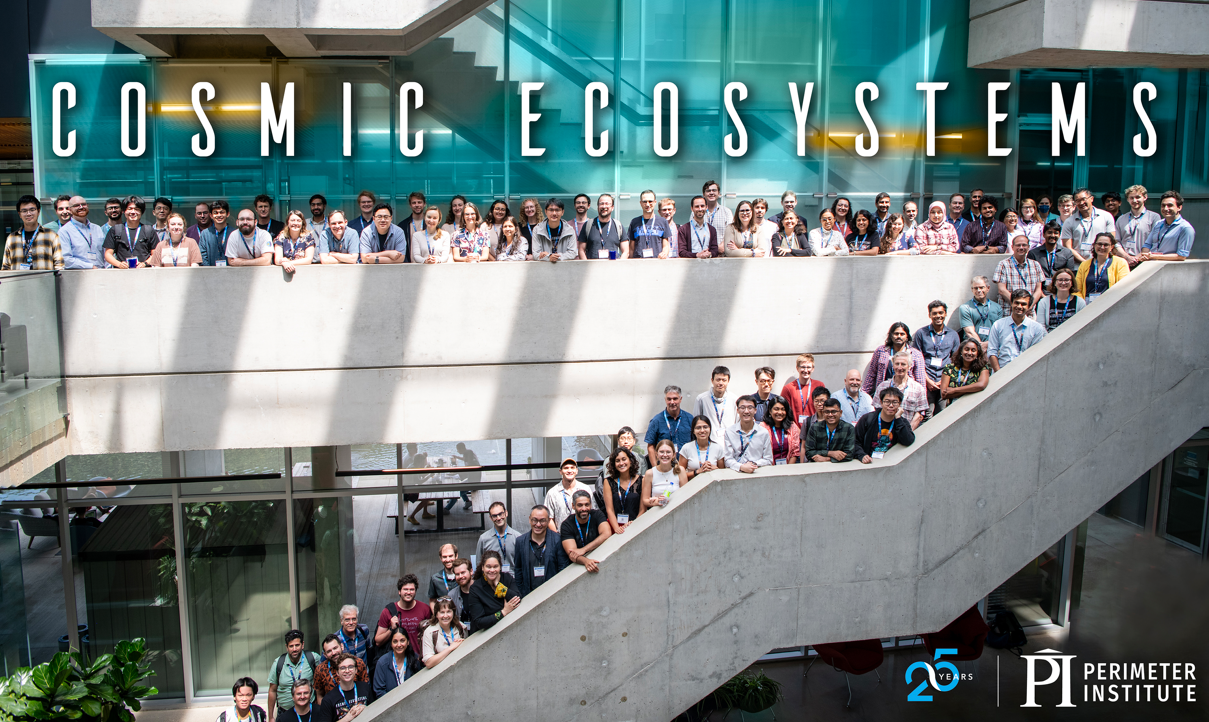
:: :: ::
Organizing Committee (LOC)
Selim Hotinli (Perimeter Institute)
Neal Dalal (Perimeter Institute)
Mike Hudson (University of Waterloo, Waterloo Centre for Astrophysics)
Matt Johnson (Perimeter Institute)
Katie Mack (Perimeter Institute)
Brian McNamara (University of Waterloo, Waterloo Centre for Astrophysics)
Arielle Phillips (University of Notre Dame / Simons Emmy Noether Fellow at Perimeter Institute)
Kendrick Smith (Perimeter Institute)
Scientific Organizing Committee (SOC)
Nick Battaglia (Cornell)
Hsiao-Wen Chen (University of Chicago)
Megan Donahue (Michigan State University)
Claude-André Faucher-Giguère (Northwestern)
Cameron Hummels (Caltech)
Selim Hotinli (Perimeter Institute)
Ian McCarthy (Liverpool John Moores University)
Daisuke Nagai (Yale)
Gwen Rudie (Carnegie Institution for Science)
Freeke van de Voort (Cardiff University)
Jessica Werk (University of Washington)
Confirmed Speakers
Alexandra Amon (Princeton)
Iryna Butsky (Stanford)
William Coulton (Cambridge University)
Sanskrti Das (Stanford)
Simone Ferraro (Berkeley Lab)
Nicholas J Frontiere (Argonne)
Vera Gluscevic (USC)*
Timothy Heckman (JHU)*
Boryana Hadzhiyska (UC Berkeley & Berkeley Lab)*
Stella Koch Ocker (California Institute of Technology)
Khee-Gan Lee (IPMU)*
Nir Mandelker (Hebrew University Jerusalem)
Chris Martin (Caltech)
Daisuke Nagai (Yale)
Andrew Newman (Carnegie Institution for Science)
Peng Oh (UC Santa Barbara)
Hiranya Peiris (University of Cambridge)
Andrew Pontzen (Durham University)
Emanuel Schaan (SLAC)
Joop Schaye (Leiden University)*
Chuck Steidel (California Institute of Technology)
Jonathan Stern (Tel Aviv University)
Mark Voit (Michigan State University)
Irina Zhuravleva (University of Chicago)
*Virtual presenters
-
QIQG 2025

QIQG 2025: Quantum Information in Quantum Gravity
QIQG 2025: Quantum Information In Quantum Gravity will unite researchers working at the intersection of quantum information theory and quantum gravity, to exchange insights and showcase recent developments bridging these fields. As part of the celebrations of Perimeter’s 25th anniversary, we will also feature vision talks by world-leading experts exploring pivotal and emerging themes at the nexus of quantum information and quantum gravity. Our program will span topics such as:- Algebraic approaches to field theory and gravity
- Observers, quantum reference frames, and relational observables
- Quantum focussing and the Generalized Second Law
- SYK and its double-scaled limit
- The quantum information theoretic structure of spacetime
- Edge modes and entanglement entropy across subregions
- The role of complexity in field theory and gravity
- The black-hole information puzzle and related issues
- Quantum error-correcting codes in quantum field theory and quantum gravity
- Quantum cryptography and its implications for gravity
- Gravitational wormholes and their information-theoretic implications
- Chaos and thermalization in many-body systems and their realization in quantum gravity
- Holographic cosmology and de Sitter space
:: :: ::
Scientific Organizers
Luca Ciambelli (Perimeter Institute)
Rob Myers (Perimeter Institute)
Chris Waddell (Perimeter Institute)
Beni Yoshida (Perimeter Institute)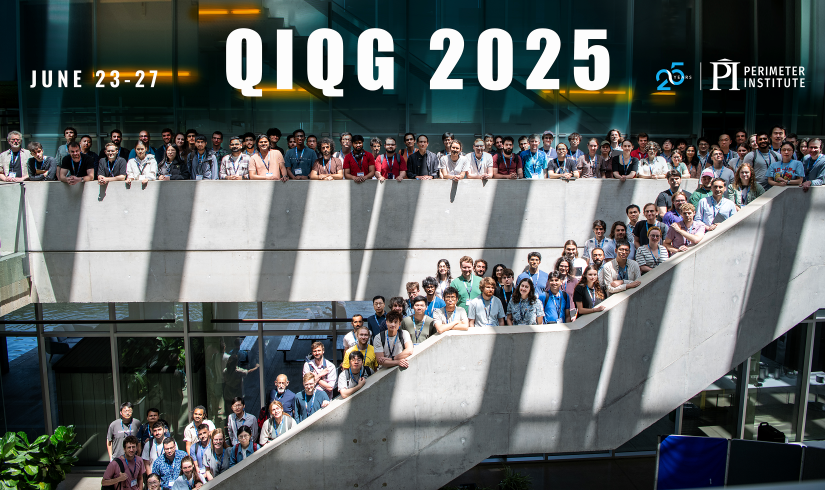
-
Lee's Fest: Quantum Gravity and the Nature of Time

What is time? Is it fundamental or emergent? This question lies at the foundation of contemporary physics and provides a key to unlocking some of its most challenging open problems, from quantum gravity to cosmology. The quest to understand time extends beyond the realm of physics, providing a privileged standpoint to address questions in diverse fields such as philosophy, mathematics, and computer science.
In this conference, we explore the nature of time from many different perspectives. This is the occasion to honor Perimeter’s “Master of Time,” Lee Smolin, and to celebrate his seminal scientific contributions. Lee Smolin is a founding faculty member of Perimeter Institute and a primary inspiration behind its spirit and design. This is an opportunity to journey back in time to the origins of some of the groundbreaking initiatives that Lee helped develop, and to look forward to future developments inspired by his achievements. The conference focuses on time but also on the foundations of quantum mechanics and the quest for quantum gravity, particularly Loop Quantum Gravity, of which Lee Smolin is a co-creator. In the spirit of Lee Smolin, the conference celebrates the interdisciplinary nature of the journey toward quantum gravity, with contributions from physics, mathematics, computer science, and philosophy.
:: :: ::
Scientific Organizers
Laurent Freidel (Perimeter Institute)
Maïté Dupuis (Perimeter Institute)
Dongxue Qu (Perimeter Institute)
Francesca Vidotto (Western University):: :: ::
Speakers
- Niayesh Afshordi (University of Waterloo)
- Stephon Alexander (Brown University)
- Giovanni Amelino-Camelia (University of Naples Federico II)
- Julian Barbour (Independent)
- Bianca Dittrich (Perimeter Institute)
- Fay Dowker (Imperial College)
- Avshalom Elitzur (Chapman University)
- Lucien Hardy (Perimeter Institute)
- Viqar Husain (University of New Brunswick)
- Jenann Ismael (Johns Hopkins University)
- Ted Jacobson (Maryland University)
- Jaron Lanier (Microsoft Research)
- Etera Livine (Lyon, Ecole Normale Superieure)
- João Magueijo (Imperial College London)
- Seth Major (Hamilton College)
- Carlo Rovelli (Aix-Marseille University)
- Simon Saunders (Oxford University)
- Simone Speziale (Aix-Marseille University)
- Francesca Vidotto (Western University)
- Steven Weinstein (University of Waterloo)
:: :: ::
Credit: Artwork by Kaća Bradonjić -
Theory + AI Workshop: Theoretical Physics for AI

This 5-day program will explore the intersection of AI and fundamental theoretical physics. The event will feature two components, a symposium and a workshop, centered around two complementary themes: AI for theoretical physics and theoretical physics for AI.
The program will begin on April 7 and 8 with a large symposium with speakers and panel discussions focusing on the promise of AI to accelerate progress in theoretical physics. These talks will address the possibilities and challenges associated with AI ‘doing science.’ The event will bring together physicists, engineers, AI researchers, and entrepreneurs to collect different perspectives on what the future of theoretical physics will look like, the engineering challenges we should expect along the way, what tools and collaborations will be needed to help get us there, and what exciting steps are already underway.
Registration for the symposium is available on the symposium website.
The symposium will be followed by a workshop on April 9, 10, 11 focusing on developing a theoretical framework for AI enabling the development of reliable, robust, and interpretable AI models for physics. Recent advances in theoretical foundations of AI, inspired by techniques from string theory, quantum field theory (QFT), and statistical physics, have uncovered parallels between AI systems and physical theories, utilizing methods like renormalization group (RG) flows, Feynman path integrals etc. to deepen understanding of deep neural networks (DNNs), generative AI (e.g., LLMs and diffusion models), and scaling laws. Key topics include physics-informed optimization and learning, the role of RG and QFT for DNNs and generative AI, and the application of physics to AI interpretability. Through interdisciplinary dialogue, the event aims to foster collaborations, advance the theoretical foundations of AI, and explore its potential in areas like theoretical physics and mathematics.Speakers:
- David Berman (Queen Mary University of London)
- Blake Bordelon (Harvard University)
- Jordan Cotler (Harvard University)
- Hugo Cui (Harvard University)
- Alessandro Favero (EPFL)
- Ro Jefferson (Utrecht University)
- Yonatan Kahn (University of Toronto)
- Dmitry Krotov (IBM)
- Bruno Loureiro (École Normale Supérieure in Paris)
- Luisa Lucie-Smith (The University of Hamburg)
- Cengiz Pehlevan (Harvard University)
- Rob Spekkens (Perimeter Institute)
Scientific Organizers:
- Anindita Maiti (Perimeter Institute)
- Matt Johnson (Perimeter Institute)
- Sabrina Pasterski (Perimeter Institute)
Advisory Committee:
- Achim Kempf (University of Waterloo)
- Cengiz Pehlevan (Harvard University)
- Hiranya Peiris (University of Cambridge)
- Roger Melko (University of Waterloo)
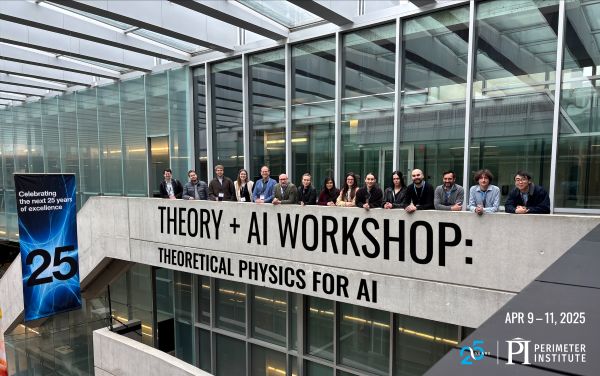
-
Theory + AI Symposium
 As Perimeter enters its 25th year, we invite you to imagine what theoretical physics research will look like 25 years from now. On April 7 and 8, Perimeter will be hosting a symposium with speakers and panel discussions focusing on the promise of AI to accelerate progress in theoretical physics. These talks will address the possibilities and challenges associated with AI ‘doing science.’ The event will bring together physicists, engineers, AI researchers, and entrepreneurs to collect different perspectives on what the future of theoretical physics will look like, the engineering challenges we should expect along the way, what tools and collaborations will be needed to help get us there, and what exciting steps are already underway.Confirmed Speakers:
As Perimeter enters its 25th year, we invite you to imagine what theoretical physics research will look like 25 years from now. On April 7 and 8, Perimeter will be hosting a symposium with speakers and panel discussions focusing on the promise of AI to accelerate progress in theoretical physics. These talks will address the possibilities and challenges associated with AI ‘doing science.’ The event will bring together physicists, engineers, AI researchers, and entrepreneurs to collect different perspectives on what the future of theoretical physics will look like, the engineering challenges we should expect along the way, what tools and collaborations will be needed to help get us there, and what exciting steps are already underway.Confirmed Speakers:
-
Frank Cappello (Argonne National Laboratory)
-
Yuri Chervonyi (Deep Mind)
-
Ioana Ciuca (Stanford University)
-
Deyan Ginev (LaTeXML)
- Geoffrey Hinton (University of Toronto)
- Shirley Ho (Polymathic & Simons Foundation)
-
Vicky Kalogera (Northwestern University)
-
Jared Kaplan* (Anthropic)
-
Peter Koepke (University of Bonn)
-
Roger Melko (University of Waterloo)
-
Moritz Munchmeyer (University of Wisconsin–Madison)
-
Axton Pitt (Litmaps)
-
Xiaoliang Qi (Stanford University)
-
Oleg Ruchayskiy (Niels Bohr Institute)
-
Gaurav Sahu (MILA)
-
Steinn Sigurdsson (arXiv)
-
Jesse Thaler (Massachusetts Institute of Technology)
-
Stephen Wolfram* (Wolfram Research)
-
Richard Zanibbi (Rochester Institute of Technology)
*virtual presentation
Scientific Organizers:-
Matthew Johnson (Perimeter Institute)
-
Anindita Maiti (Perimeter Institute)
-
Sabrina Pasterski (Perimeter Institute)
Advisory Committee:- Mykola Semenyakin (Perimeter Institute)
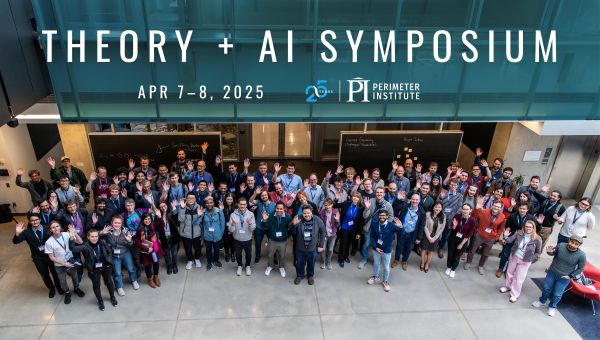
-
-
Magnetic Fields Around Compact Objects Workshop
 In the vicinity of neutron stars and black holes, where spacetime is strongly curved, magnetic fields can power many of the violent phenomena that we observe across the entire electromagnetic spectrum, from accretion and jet launching, to magnetar flares and pulsar emission. In the last decades, our theoretical understanding of the role of magnetic fields in these extreme environments has greatly improved through numerical simulations of magnetohydrodynamical fluids and charged kinetic particles; however, many open and important questions remain. Our observational capabilities and computational resources will keep growing dramatically in the next few years, allowing us to explore high-energy astrophysics in unprecedented regimes. Improving our knowledge of how magnetic fields, matter, and gravity interact with each other is a crucial piece in the new era of multimessenger astrophysics.This workshop will gather experts from a wide range of disciplines within physics and astrophysics to present state-of-the-art advances in theoretical models of magnetic fields and high-energy plasma in different contexts, from neutron star mergers to supermassive black holes, and from micro scales to macro scales.
In the vicinity of neutron stars and black holes, where spacetime is strongly curved, magnetic fields can power many of the violent phenomena that we observe across the entire electromagnetic spectrum, from accretion and jet launching, to magnetar flares and pulsar emission. In the last decades, our theoretical understanding of the role of magnetic fields in these extreme environments has greatly improved through numerical simulations of magnetohydrodynamical fluids and charged kinetic particles; however, many open and important questions remain. Our observational capabilities and computational resources will keep growing dramatically in the next few years, allowing us to explore high-energy astrophysics in unprecedented regimes. Improving our knowledge of how magnetic fields, matter, and gravity interact with each other is a crucial piece in the new era of multimessenger astrophysics.This workshop will gather experts from a wide range of disciplines within physics and astrophysics to present state-of-the-art advances in theoretical models of magnetic fields and high-energy plasma in different contexts, from neutron star mergers to supermassive black holes, and from micro scales to macro scales.Scientific Organizers:
Luciano Combi (Perimeter Institute & U of Guelph)
Sean Ressler (CITA)
Bart Ripperda (CITA)
Luis Lehner (Perimeter Institute)
Will East (Perimeter Institute)
Gibwa Musoke (CITA)
Chris Thompson (CITA)
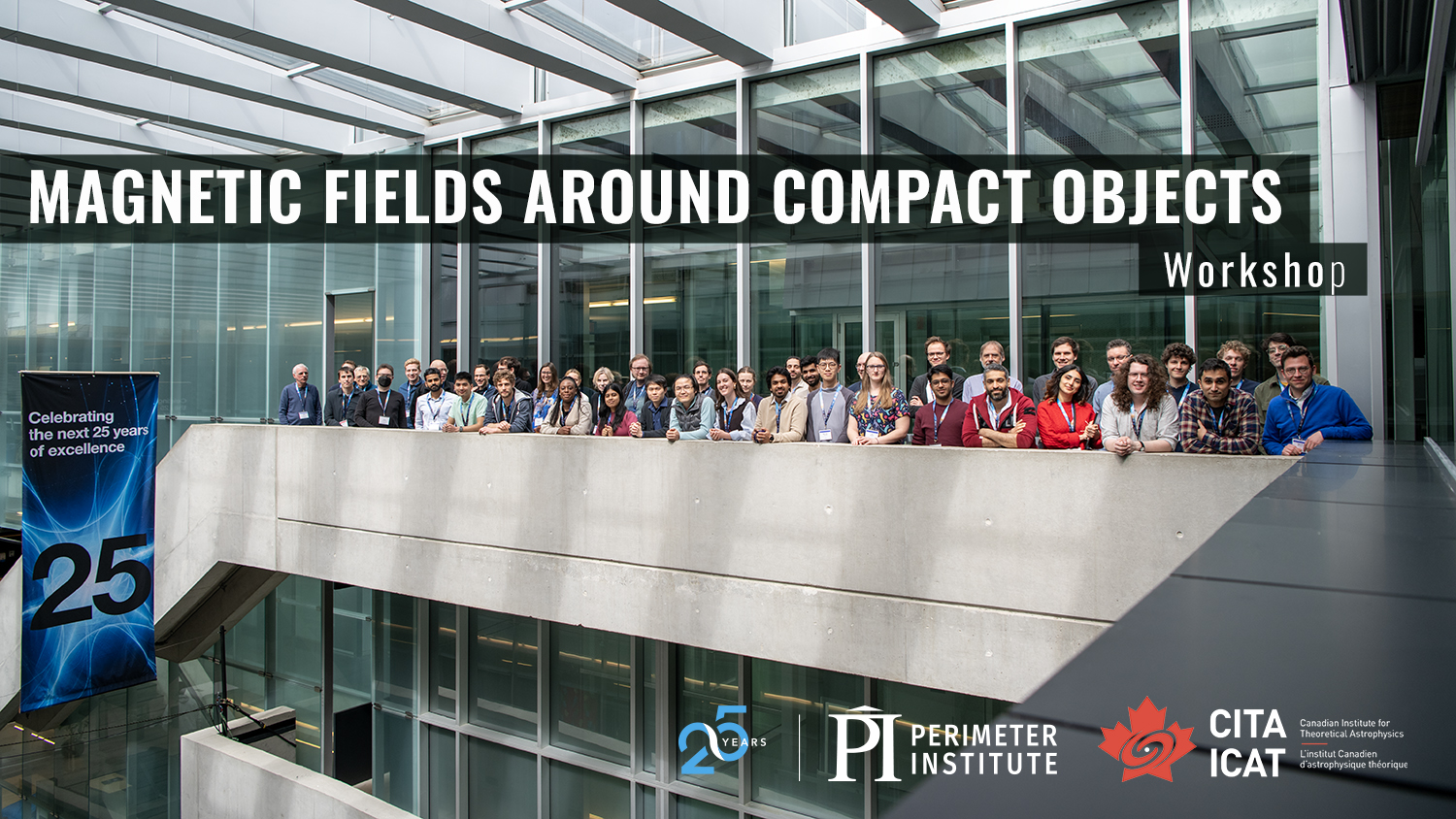
-
Emmy Noether Workshop: Quantum Space Time

Constructing a theory of quantum gravity, and with it a notion of quantum spacetime is one of the biggest challenges faced by modern theoretical physics. This workshop will bring together researchers from a wide range of viewpoints and give them an opportunity to exchange ideas and gain new insights.
The workshop is supported by the Simons Foundation.
:: :: ::
Workshop Speakers
Marcela Carena (Perimeter Institute)
Astrid Eichhorn (Universität Heidelberg)
Netta Englehardt (MIT)
Johanna Erdmenger (University of Würzburg)
Gulia Gubitosi (University of Naples Federico II)
Renate Loll (Radboud University)
Jessica Muir (Perimeter Institute)
A.W. Peet (University of Toronto)
Alessia Platania (University of Copenhagen)
Jocelyn Read (California State University, Fullerton)
Kasia Rejzner (York University)
Mairi Sakellariadou (King's College London)
Sarah Shandera (Pennsylvania State University)
Sumati Surya (Raman Research Institute)
Karen Yeats (University of Waterloo):: :: ::
Scientific Organizers
Bianca Dittrich (Perimeter Institute)
Sabrina Pasterski (Perimeter Institute)
Céline Zwikel (Perimeter Institute)
Sruthi Narayanan (Perimeter Institute) -
Future Prospects of Intensity Interferometry

Recent advancements in photodetection technologies and spectroscopy hold the promise of transforming intensity interferometry, thereby revolutionizing observational Astronomy by enabling observations to resolve significantly fainter objects than currently possible. This workshop serves as a platform to unite experts in photodetection, theoretical and observational astronomy, as well as observers and theorists from diverse disciplines, to explore the multifaceted capabilities of intensity interferometry.
The workshop's focus spans three key objectives:
- Develop and disseminate novel ideas concerning science cases unique to intensity interferometry.
- Synthesize insights from observers and photodetector experts concerning the requisite technologies and experimental techniques which will allow for new science with intensity interferometry.
- Initiate a concentrated effort to propel the development of large telescope arrays dedicated to intensity interferometry.
This workshop will be exclusively organized in plenary sessions, providing ample time for engaging discussions among participants.
Scientific Organizers
Masha Baryakhtar - University of Washington
Neal Dalal - Perimeter Institute
Marios Galanis - Perimeter Institute
Junwu Huang - Perimeter Institute